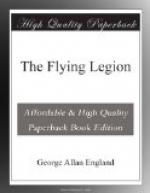Breathing only through open mouths, for greater stillness, taking care to crackle no twig nor even slide loose sand, they labored on, under the pale-hazed starlight. Their goal was vague. Just where they should come upon the Beni Harb, in that confused jumble of dunes and nullahs (ravines) they could not tell; nor yet did they know the exact distance separating the Legion’s trenches from the enemy. All was vague mystery—a mystery ready at any second, at any slightest alarm, to blaze out death upon them.
None the less, stout-hearted and firm of purpose, they serpented their painful way prone on the hot, dusty bosom of the Sahara. Fate for them and for all the Legion, lay on so slight a thing as the stirring of a twig, the tunk of a boot against a bleached camel’s skull, the possibility of a sneeze or cough.
Even the chance scaring-up of a hyena or a vagrant jackal might betray them. Every breath, every heartbeat was pregnant with contingencies of life and death.
Groveling, they slipped forward, dim, moving shadows in a world of brown obscurity. At any moment, one might lay a hand on a sleeping puff-adder or a scorpion. But even that had been fore-reckoned. All three of them had thought of such contingencies and weighed them. Not one but had determined to suppress any possible outcry, if thus stricken, and to die in absolute silence.
What mattered death for one, if two should win to the close range necessary for discharging the lethal capsules? What mattered it even for two, if one should succeed? The survivors, or the sole survivor, would simply take the weapons from the stricken and proceed.
After what seemed more than an hour, though in fact it was but the ten minutes agreed on with Bohannan, off behind them toward the coast a sudden staccato popping of revolvers began to puncture the night. Up and down the Legionaries’ trench it pattered, desultory, aimless.
The three men engaged in the perilous task of what the Arabs call asar, or enemy-tracking, lay prone, with bullets keening high overhead. As the Master looked back, he could see the little spurts of fire from that fusillade.
The firing came from more to the left than the Master had reckoned, showing him that he had got a little off his bearings. But now he took his course again, as he had intended to do from the Legion’s fire; and presently rifle work from the Arabs, too, verified, his direction.
The Master smiled. Leclair fingered the butt of his revolver.
Rrisa whispered curses:
“Ah, dog-sons, may you suffer the extreme cold of El Zamharir! Ah, may Rih al Asfar, the yellow wind (cholera), carry you all away!”
The racket of aimless firing continued a few minutes, underneath the mild effulgence of the stars. It ceased, from the Legion’s trenches at the agreed moment; and soon it died down, also from the Arabs’. Quiet rose again from the desert, broken only by the surf-wash on the sand, the far, tremulous wail of a jackal, the little dry skitter of scorpions.




